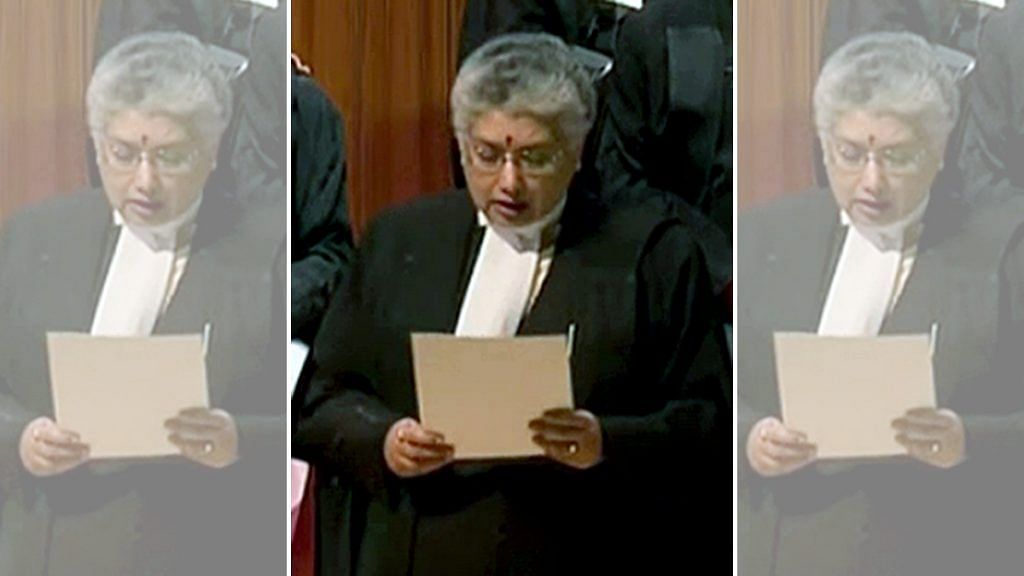New Delhi: In her dissenting opinion in a case pertaining to vicarious liability of the government for statements made by a minister, Supreme Court Justice B.V. Nagarathna Tuesday asserted that hate speech denies human beings the right to dignity and strikes at the foundational values of equality, liberty and fraternity enshrined in the Constitution.
The case before the court arose out of petitions against speeches made by Samajwadi Party (SP) leader Azam Khan and Communist Party of India (Marxist) leader M.M. Mani when they were ministers in the Uttar Pradesh and Kerala governments, respectively.
Highlighting the greater responsibility placed on public functionaries and celebrities for what they say, Justice Nagarathna wrote in the order, “Public functionaries and other persons of influence and celebrities, having regard to their reach, real or apparent authority and the impact they wield on the public or on a certain section thereof, owe a duty to the citizenry at large to be more responsible and restrained in their speech.”
“They are required to understand and measure their words, having regard to the likely consequences thereof on public sentiment and behaviour, and also be aware of the example they are setting for fellow citizens to follow,” she added.
The five-judge bench hearing the case comprised Justices S. Abdul Nazeer, B.R. Gavai, A.S. Bopanna, V. Ramasubramanian — who authored the majority opinion — and B.V. Nagarathna.
The majority verdict ruled that statements made by a minister, even if such statements are ‘traceable to any affairs of the State or for protecting the government’, cannot be attributed vicariously to the government, essentially ruling that a government cannot be held vicariously liable for statements made by a minister.
On the other hand, Justice Nagarathna in her dissent ruled that a statement made by a minister, if traceable to any affairs of the State or for protecting the government, can be vicariously attributed to the government, as long as the statement represents the larger view of the government. However, she clarified that if such a statement is not consistent with the view of the government, then it will be seen as a stray opinion of the minister.
She, therefore, ruled that public functionaries could be held personally liable if their statement is inconsistent with the views of the government. If, however, such views are consistent with the views of the government, or are endorsed by the government, then they can be vicariously attributed to the State and an action can be brought against the State accordingly.
The judge, however, added that it is for the respective political parties to regulate and control the actions and speech of its functionaries and members. This, she suggested, could be done through enactment of a Code of Conduct which would prescribe the limits of permissible speech.
Also Read: Justice Nagarathna’s dissent in demonetisation case — ‘well-intentioned but unlawful’
Right to dissent
The first petition in the case had arisen out of a statement made in 2016 by Azam Khan, then Minister for Urban Development in the Akhilesh Yadav-led SP government in UP, with regard to the gangrape of a mother-daughter duo on a highway near Bulandshahr in July 2016.
Objecting to his remarks terming the incident a “political conspiracy”, the survivors had filed a petition before the apex court seeking action against Khan. While directing him to submit an unconditional apology, the court had said that the case raised serious constitutional questions.
The second case concerned certain allegedly offensive remarks made by then minister M.M. Mani against a female principal of a local polytechnic college in Kerala, as well as against women labourers at a tea plantation.
Justice Nagarathna agreed with the majority opinion that restrictions under Article 19(2) of the Constitution are exhaustive and no additional restrictions can be incorporated into this list.
Article 19(2) lists eight grounds on which the right to freedom of speech and expression can be reasonably restricted: in the interest of sovereignty and integrity of India, security of the State, friendly relations with foreign states, public order, decency or morality, contempt of court, defamation, and incitement to an offence.
In her dissenting opinion, Justice Nagarathna pointed out that the freedom of speech includes the right to dissent, observing that the “right to dissent is an essential prerequisite of a healthy democracy”.
“In fact, the right to dissent is the essence of a vibrant democracy, for it is only when there is dissent that different ideas would emerge which may be of help or assist the Government to improve or innovate upon its policies so that its governance would have a positive effect on the people of the country which would ultimately lead to stability, peace and development which are concomitants of good governance,” she observed.
Asserting that it is for Parliament to bring a law to restrain citizens and public functionaries from making disparaging or vitriolic remarks against fellow citizens, she said that the court cannot frame any rules to define the precise threshold of acceptable speech in this context.
However, Justice Nagarathna asserted that “every citizen’s conscious attempt to abide by the Constitutional values…will significantly contribute in eliminating instances of societal discord, friction and disharmony, on account of disparaging, vitriolic and derogatory speech, particularly when made by public functionaries and/or public figures.”
The judge concluded that any citizen, who is prejudiced by any form of attack, as a result of speech/expression targeted against her or by ‘hate speech’ by a public functionary or anybody else, can seek appropriate remedies under criminal and civil law.
(Edited by Amrtansh Arora)
Also Read: A month of CJI Chandrachud’s SC reforms – mobile app upgrade, accessibility panel, hackathon
